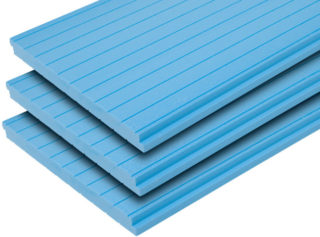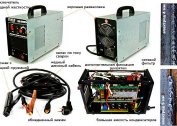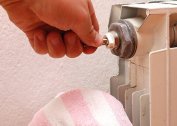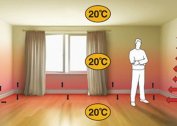Expanded polystyrene is a popular material for warming building structures. One of the common forms is the stove. They are easy to install, they have good technical characteristics and are not expensive. There are various ways of laying the material, which should be familiarized with before installation.
Purpose and composition of the material
Expanded polystyrene boards have been produced for several decades. The material is suitable for the insulation of walls, ceilings, roofs, foundations, facades, floors and other building structures. Two main types of expanded polystyrene are used - ordinary polystyrene and extruded polystyrene foam. The second material is an improved version of the foam.
The composition of expanded polystyrene includes polystyrene, polydichlorostyrene, styrene copolymers, blowing agents (hydrocarbons, blowing agents, freons), various additives in the form of dyes, modifiers and flame retardants.
There are various ways to produce polystyrene foam tiles, but two are common:
- Pressureless suspension. Thanks to suspension polymerization, granules with liquid are obtained. By heating, they increase in size and form a cellular structure. It turns polystyrene.
- Extrusion. The granules are mixed with a blowing agent at a high pressure and temperature, and then removed from the extruder. It turns out a material that has a uniform structure with closed pores and with cells up to 200 microns in size.
Expanded polystyrene plates are widely used in insulation - internal and external. This is a material with good technical characteristics and a simple installation method. Slabs with a layer of foil are available. It creates a reflection of heat inside the room.
The most popular types of expanded polystyrene are products marked PSB S 59, PSB S 25, PSB S 15. The abbreviation is deciphered as follows: PS - expanded polystyrene, B - non-pressurized, C - self-extinguishing. Numbers indicate the maximum density of the sheet.
Key Specifications
Properties of extruded polystyrene foam:
- thermal conductivity 0.028-0.034 W / m × K;
- material density 28-45 kg / m3;
- water absorption by volume for 30 days, 0.4%;
- working temperatures -50 ° С to + 70 ° С.
Extruded polystyrene foam has better performance compared to expanded polystyrene. It has a high compressive strength, absorbs less moisture and weakly passes steam.
Advantages and disadvantages
The advantages of expanded polystyrene plates include:
- Good heat transfer resistance.
- Ease. The minimum weight of polystyrene heat-insulating smolders is provided by their structure.
- Simplicity and ease of installation. The material is easy to cut into parts, it does not require a complicated method of fastening.
- Possibility of coating with plaster, putty and other decorative finishes.
- High strength.
- Low cost.
- Duration of operation.
- Environmental friendliness and safety for human health.
- Resistance to biological corrosion.
- Increased moisture resistance and low absorbency.
The main disadvantages of the material include:
- Fire hazard.If you use expanded polystyrene boards without flame retardant, which create a protective flame-retardant film, the risk of fire increases.
- Low vapor permeability. Requires the creation of additional ventilation.
- Expanded polystyrene panels can damage rodents.
- Poor resistance to organic solvents.
- When the temperature is exceeded above 160 ° C, styrene is released.
Despite the shortcomings, polystyrene foam is a popular and reliable material for building insulation. It is convenient and easy to work with, it is available in all regions of the country and effectively copes with its task.
The use of insulation
The availability of the material and its properties have made polystyrene foam a popular insulation material. It can be used as a heat insulator in some types of household appliances, often used in packaging.
Wall insulation in buildings is carried out with PSB-S polystyrene of different density, which is selected depending on the place of application. Greater breathability allows it to be used for residential premises with the creation of a more comfortable microclimate. The use of PSB-S brand boards in external insulation is associated with the absence of the need for a layer of vapor and waterproofing, the possibility of applying finishing materials directly to the sheets of the heat insulator.
Selection recommendations
Expanded polystyrene is produced by various well-known brands. To choose the best view, you need to use the following tips:
- Preliminary study the parameters of the proposed products. It is necessary to determine the place of installation of the insulation, climatic conditions, the required thickness of the plates.
- Checking the standards by which the heat insulator is made. In the case of manufacturing products not according to GOST, but according to the company's own specifications, the specifications may vary. In the name PBS-S 40, the density lies in the range from 28 to 40 kg / cubic meter. This variation is associated with lower production costs for less dense sheets. A more accurate value can be found in the documentation for expanded polystyrene.
- Before making a purchase, it is recommended to break off a small piece of material from the edge of the sheet. If the product is low-grade, the foam will break with an uneven edge, and balls will be visible on the sides. The material made by the extrusion method will break even with the shape of regular polyhedra. A fault line will pass through some of them.
It is important to pay attention to the company that produces polystyrene boards. High-quality products are produced by European companies from Germany, Finland, Poland. Well-known manufacturers are Polimeri Europa, Nova Chemicals, BASF. Of the Russian brands, Penoplex, Technonikol can be distinguished. For several decades they have been producing heat-insulating materials based on polystyrene foam and have corresponding production capacities. The products sold have excellent properties and characteristics.
Insulation should be bought only in professional stores. In them, products have the necessary licenses and certificates, as well as guarantees.







